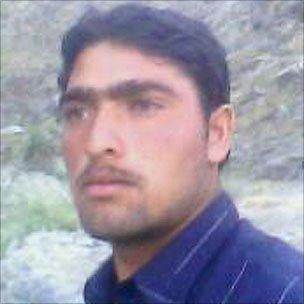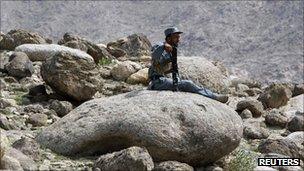Anatomy of an Afghan 'turncoat' killer
- Published

Ezatullah Wazirwal was a popular border guard with a spotless record
In November 2010, an Afghan border policeman with an excellent record of service killed six US soldiers as they all sat down for tea during a routine training session. Why did he do it? A study of his life story - and his mobile phone - provides only a few clues.
It was a chilly winter day in Nangarhar province and the mountains in the distance were covered in snow. While US soldiers training a small group of Afghan border guards were resting during a break, Ezatullah Wazirwal offered his American colleagues some tea.
"The trainers relaxed and put down their body armour and guns. It was then that Ezatullah opened fire," one of his fellow unit members said.
Wazirwal had served for three years in the border police and was a popular guard with a spotless record. His brother - also a border guard - watched aghast as Wazirwal killed the US soldiers and was then himself shot dead.
So what went wrong? Intelligence sources responsible for vetting recruits told me they had absolutely nothing on him but they now believe he had been recruited by the Taliban. Wazirwal's family and friends, however, refuse to accept this theory.
A girl in Jalalabad
Ezatullah Wazirwal came from the remote and mountainous farming district of Khogyani in the eastern province of Nangarhar.
Tribal elders in his home village recall a cheeky young boy who revelled in teasing his friends and stealing from neighbours' gardens.
Most people in his village looked to the police and army - rather than the Taliban - as a source of security and as a path for self-improvement and, according to those who knew him, Wazirwal was no friend of the Taliban.
His friends and colleagues say that he was fed up with constant Taliban meddling in the daily affairs of ordinary people.
He and his brother enrolled in the border police to escape abject poverty, but this exposed them to the possibility of Taliban reprisals.
"He was afraid that the Taliban would come after him as he had dared to join," says Wazirwal's childhood friend, Mohammad Yasin.
He moved his parents from the village to a larger town, for extra security.
And just like many young men - Wazirwal was in his mid-20s - he was in love. His love interest was a high school student from Jalalabad, who he pursued doggedly after meeting her in an ice-cream shop on a visit to the city. She described him as a chirpy young man who was caring, polite and funny.
"He dreamed of owning a house in Jalalabad and settling down there with the girl," says Wazirwal's friend, Engineer Mohammad Ebrahim.
There is a clip of Wazirwal talking to his beloved in Jalalabad, recorded on his mobile phone.
"I am not what you think I am. I would come during the night and meet you. I also own a vehicle. We would live together happily," a worried Wazirwal tries to reassure the reluctant girl at the other end of the line.
And Wazirwal's phone was full of popular Pashto songs, photos of Pakistani actresses and Bollywood star Aishwarya Rai. There were family photographs, and pornography.
So far, so normal.
Basic emotions
But the phone also contained Taliban songs, mostly hypnotic chants without music, in the kind of Pashto spoken in Afghanistan's eastern and southern areas, or the dialect of Pakistan's tribal areas.
One song goes: "You are the martyr of Islam. You are fighting for the religion of God. God doesn't forget such sacrifices."
An intelligence official, by chance from the same village as Wazirwal, told me that he himself can get confused about his allegiances, listening to such songs.
Taliban song pours scorn on a man who will not fight
They prey on the basic emotions of Afghan villagers, blending religious faith and ideas about masculinity with condemnation of the supposed evils of the West.
"In rural areas, in deprived areas - people are uneducated and very religious. You play such songs to them and this is a magnet for Taliban recruitment," he says.
There is one song dedicated to the hegemony of the US dollar: "You Dollar have no shame, you have misled a lot of people. You have managed to buy a lot of people. You are so powerful, Hey you have no shame, you dollar!"
One song on Wazirwal's phone scorns a man refusing to fight, castigating him as a "woman" and telling him to "put bangles on".
But the fact that these songs were on his phone proves little. Many people across Afghanistan have Taliban songs on their phone and it does not necessarily imply allegiance to insurgents.
Taliban song about martyrdom found on Ezatullah Wazirwal's phone
There are some other indications, however, that Wazirwal's state of mind was changing in the weeks before the attack.
The girl in Jalalabad says he had not called or visited for three months, while Mr Ebrahim says Wazirwal's dangerous life patrolling Afghanistan's border, involving frequent skirmishes with militants, was getting him down.
"He was tired of fighting... He always complained of his long duty hours and bad food. He also sorely missed his friends," he says.
Family ties
But for intelligence officials, the key discovery is that Wazirwal travelled home to Khogyani three days before killing the soldiers.
They believe that he spent time with his uncles, who had fought alongside well-known local Taliban commanders, and was recruited by them.

The part of Nangarhar province where Wazirwal's police unit served has a rugged and bleak landscape
Wazirwal's devastated friends, however, do not accept the verdict.
"They must have blackmailed him. We can tell you he was not a Talib," says Mohammed Yasin.
Intelligence officers confess they are amazed that Wazirwal never did anything unusual or suspicious before turning his gun on the Americans.
The great challenge for Afghanistan's security forces is to prevent insurgents from influencing young men like Wazirwal.
But a senior counter-terrorism official who has studied Wazirwal's case warns there will be more "turncoat" attacks, simply because so many soldiers come from areas where insurgents are in control.
Even carefree village boys who become conscientious border guards cannot avoid being exposed to militancy and radicalism, when it is all around them.
- Published29 November 2010